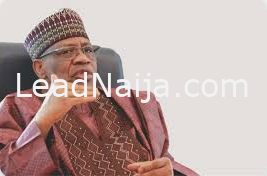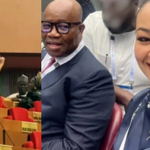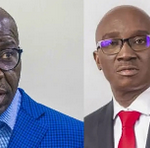Thirty-nine years after, former military president, General Ibrahim Babangida has thrown more light on two major events that shaped his administration – the assassination of renowned journalist Dele Giwa and the execution of his friend and colleague, Major General Mamman Vatsa, over a coup plot.
While he dismissed insinuations of his administration’s orchestration of the Giwa assassination on October 19, 1986 as “cheap and foolish,” Babangida said Vatsa’s death, via execution for a coup plot, “was a personal loss of a childhood friend.”
Among other major incidents, like the Gideon Orkar coup, the Organisation of Islamic Conference (OIC) crisis, Structural Adjustment Programme (SAP) protests, the C130 air crash, the Dele Giwa and Vatsa deaths had more personal impact on the former military president who described both as close friends.
Giwa, the founding editor-in-chief of Newswatch Magazine, was murdered in Ikeja, Lagos State on October 19, 1986 through a parcel bomb with an alleged federal government logo.
His close friend, associate and veteran journalist, Ray Ekpu, had in an interview stated that the government knew those who killed Giwa, recalling that the Oputa Panel said the Babangida administration was culpable.
Also, a retired police chief, Chris Omeben, who conducted the investigation on the murder of renowned journalist, told NAN in 2015 that the high-profile investigation was marred by interference from “high places”.
Babangida, who defined his friendship with Giwa as close, recounted how his death impacted him, while refuting insinuations that his administration was involved.
In his book, ‘A Journey In Service, which was launched on Thursday, Babangida said, “The insinuation that the parcel may have come from the headquarters of the administration was cheap and foolish. Why would an officially planned high-level assassination carry an apparent forwarding address of the killer? Why would a government-planned and executed crime point directly at the suspect? All this did not make sense to me.
“Much as this incident rattled me, I also accepted and understood it to be part of the challenges of the task I had taken on. I was responsible for acting in the public interest, but only in the context of the institutions and mechanisms of government. I had no alternative but to resort to the state’s investigative apparatus. The police and the intelligence services were all I had to rely on.”
Babangida accused The Newswatch legal team of resorting to play to the gallery of public sentiment which did not help the case.
He said the legal team directed public focus to only one suspect, his administration, which “may have hurt the path of a fruitful investigation.”
The former president described Giwa as his good friend with whom he spoke often on the phone, noting that the novelty and tragic impact of the incident badly shook the nation.
“I was equally shocked by it all. On a personal level, I had just lost a friend. Mr Giwa was a good friend, like a few other senior journalists in the country. We spoke often on the phone and met a few times.I valued his deep insight on national issues and respected his views and reach as a media leader.
“My sense of loss was, however, overwhelmed by the public outcry and the feeling of tragedy in the introduction of an entirely novel mode of killing in our country,” he said.
He said media hysteria did not help the investigation of the Giwa murder.
“As is typical of the Nigerian media, the direction was marked by an adversarial attitude towards government, which has remained the hallmark of the Nigerian media from its colonial heydays.
“It was an attitude of ‘we versus the government’ that has remained today. It is a situation in which the government is adjudged guilty even before the evidence in a case is adduced.
“When the Obasanjo civilian administration reopened the Giwa case at the Oputa Panel on Human and Civil Rights, I expected that the police and lawyers would come forward with new evidence as to their findings on the Giwa murder over the years. Nothing of such happened. The Giwa, like all mysterious murders, has remained unsolved after so many years. I keep hoping the truth will be uncovered in our lifetime or after us. More often than not, mysterious crimes are solved long after their commission,” the former president said.
IBB, as he is fondly called, also reflected on the drama that surrounding the coup and the eventual execution of General Vatsa, whom he described as a childhood friend.
Vatsa and nine other co-conspirators were executed for planning a coup against the Babangida administration in March 1986.
Some prominent Nigerians had sought clemency for Vatsa who insisted on his innocence.
Babangida however maintained that the evidence against Vatsa was overwhelming, recalling that he had dismissed several rumors of the coup plot involving his former friend.
“When the coup was first uncovered, I did not quite believe the extent of Vatsa’s involvement. Even worse were the details of the dastardly plans, including plans to bomb the Eko Bridge in Lagos and possibly hijack the presidential jet to eliminate the president.
“As the details kept coming in, it became harder not to believe the integrity of the disclosures. I felt a deep personal sense of betrayal. There were details of conversations, funding, travel itinerary and recruitment of troops to support the operation,” he said.
He added that Vatsa and the other conspirators had planned a bloody coup which would have plunged the country into darkness.
“I had to choose between saving a friend’s life and the nation’s future. Above all, everyone who had signed on to military career understood clearly what it meant to plan a coup and fail. The penalty was clear and unmistakable.”
He said given his closeness to Vatsa and the political interpretations that emerged about his coup plot after his trial and execution, it was not surprising that agents of subsequent political dispensations tried to weaponise the Vatsa coup as a political tool against him in the post-1999 political ploys.
“Unfortunately, some members of the Vatsa family lent their voices and presence to these ploys, which fizzled out in due course,” he said.



